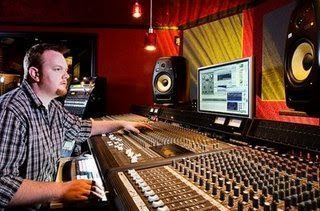 If you've spent anytime recording in a studio at all, you've probably noticed that the tracking process takes much longer than anyone on the performance side had anticipated.If you haven’t spent much time in the studio, be prepared, this will inevitably happen no matter how prepared you think you are. This is due to many factors; anything from getting in the studio and finding new sounds to experiment with, not quite being prepared (see last week’s blog on performance), having a picky producer (not necessarily a bad thing), and sometimes, what is commonly referred to as "red-light syndrome."
If you've spent anytime recording in a studio at all, you've probably noticed that the tracking process takes much longer than anyone on the performance side had anticipated.If you haven’t spent much time in the studio, be prepared, this will inevitably happen no matter how prepared you think you are. This is due to many factors; anything from getting in the studio and finding new sounds to experiment with, not quite being prepared (see last week’s blog on performance), having a picky producer (not necessarily a bad thing), and sometimes, what is commonly referred to as "red-light syndrome."Experimenting in the studio can be magical when you hit on something special. If you're on a budget, however, it can be death to your wallet. The easiest way to avoid this problem is to get your parts down, do pre-production, and decide between you, your band members, and/or your producer exactly what is going on the album.
Picky producers are a curse and blessing. They are a blessing because they will not settle for, "oh that was good enough," or "no worries, we can fix it in the mix." They will ensure the highest quality of your final product because everything going into it is the best it can be. The curse is that of the bleeding wallet. If you are on an extremely tight budget, being picky about what parts are laid down can cause you to go over what you expected it to take. The reason this pops up more often in the studio is when you closely and accurately record a sound, all the little details come out. That note you're singing barely flat or just too long, or when you hit muted strings while playing your guitar solo. Point being, don't plan on doing things in one take, you'll just set yourself up for disappointment and frustration.
Lastly, we have the dreaded "red-light syndrome." This occurs when you go in, feel like you can play all your parts in your sleep, the recording light comes on, and you start playing like you're two years old. Here's the kicker with this one: It's 100% psychological and the only cure is doing it over and over again to get used to that hot red light shining down on you. What you want to take away from this, is that many artists go through this when they're new to the recording situation. You're not weird, you don't suck, and you're not a failure. You're just learning.
By far the best thing you can do to minimize extra time spent in the studio is to follow everything I talked about in last week’s blog about being prepared for the studio. If you’re concerned about how going over in hours will affect your budget, trust what the engineer and producer say about how long it takes when it comes time to estimate hours for the entire project.As long as they’re charging you accurately and fairly, you won’t have any surprises at the end of recording.
My iPod is still only a quarter full. Go make me some more music!
Kyle




No comments:
Post a Comment